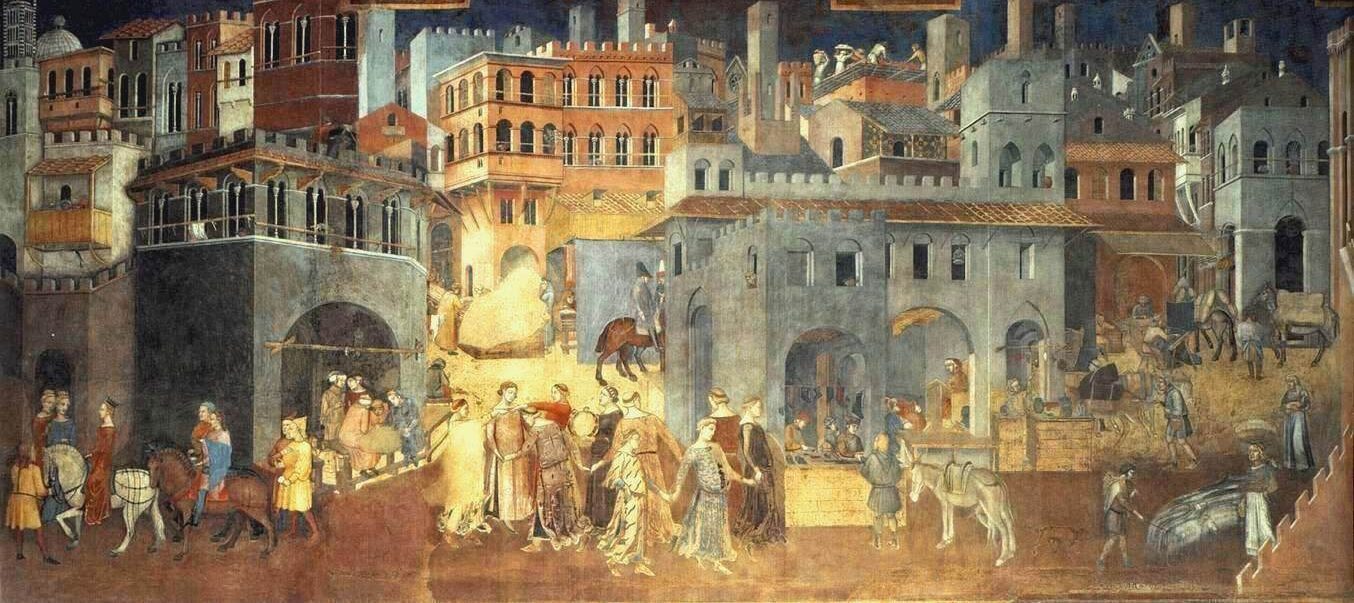
It has long been a custom among commentators that, when looking for a comparator that will blacken any reputation, cloak your own judgement in righteousness, and win all arguments, you have permission to vault over centuries of human iniquity, committed on every continent and body of water, to land on a single, all-purpose byword for the worst of human behavior: medieval.
It is also true, however, that the Middle Ages have always had their defenders: writers who have diligently elucidated achievements that were ignored, belittled, or simply unknown to conventional wisdom. In this field of what might be called medieval apologetics, a cluster of ideas has emerged in the last decade that have the potential to move the dial, finally, on this old prejudice.
In 2019, the journal Science published a paper by scholars from George Mason and Harvard that, using data from both real-world human activity and psychological experiments, identified patterns of behavior so strong, they superseded mere coincidence or correlation and assumed predictive force. The paper demonstrated that psychological traits prized in the West—trust and cooperation among strangers, for instance, or the capacity to resist pressure to conform—could be traced to the length of exposure to the medieval Western Church. The reason? The Church’s ban on cousin marriage, which disrupted intensive kin-based loyalties and, over time, rewired the Western mind.
The Catholic influence goes further. In 2011, academics from the universities of Warwick and Munich found that modern residents of regions whose territory formerly composed the Catholic Habsburg empire have higher trust in courts and police than those living in adjoining regions formerly part of the Orthodox Russian or Muslim Ottoman empires.
The Science paper explains why all of this might be; fewer tribalistic loyalties disincentivize corruption and hardwire trust among strangers. Its findings went on to be the subject of an article in the Washington Post, which quoted one of the researchers, Duman Bahrami-Rad, who had been raised in Iran (where 30 percent of marriages are to first and second cousins), saying that when he moved to the U.S. he found it “weird that Westerners don’t fall in love with their cousins.” In 2020, another of the researchers, Harvard professor Joseph Henrich, expanded the research into a successful book—published in the U.K. by Allen Lane—that popularized the acronym WEIRD: Western, Educated, Industrialized, Rich, Democratic. The book expounded the surprising explanation for how these characteristics have aggregated among populations and changed the entire course of history. Science, the Washington Post, Allen Lane: The word is out.
And what about Tom Holland’s Dominion, published in 2019 and talked about ever since? In this book, Holland, who at one point dismissed the Christianity of his upbringing, argued that the originators of the very concept of human rights were not high-minded, free-thinking philosophers of recent centuries but canon lawyers of the Middle Ages. More precisely, Holland observed, while the principle that the rich have a duty to give to the poor is as old as Christianity itself, until the Middle Ages no one had thought to argue for a “matching principle”: that the poor had “an entitlement to the necessities of life.” This was, in a formulation increasingly deployed by canon lawyers, a human “right.” The church-state divide, too, comes from the medieval. In Millennium, a kind of warm-up act for Dominion, Holland made the case that the eleventh-century popes more or less invented the essential Western division between religion and the secular.
And then there is Stephen Meyer, the foremost proponent of intelligent design of our day (who went three-and-a-half hours with Joe Rogan in 2023). It would seem highly counterintuitive for a scientist striving to overcome modern unbelief to invoke a medieval pope as the catalyst of the scientific method; but this is what Meyer does in Return of the God Hypothesis.
Meyer recounts how, in 1277, Étienne Tempier, bishop of Paris, with the support of John XXI, condemned “necessarian theology.” Under the influence of the ancient Greeks and particularly Aristotle, some University of Paris faculty had held that nature must conform to set logical principles: For instance, that the planets were in the realm of crystalline spheres where only perfection was possible, and since the most perfect form of motion was circular, the planets must have circular orbits. But for science to advance, natural philosophers needed to develop “a more empirical, evidence-based approach”; and this, according to Meyer, began with Tempier and the pope condemning faulty logical foundations.
It has been remarkable to see such ideas about the Middle Ages appearing in places with such enormous reach. However, appearing in the mainstream does not equate with being mainstream. Achieving mass acceptance will require ceaseless repetition, cross-referencing, and harking back—not over years but decades. Nevertheless, these ideas are now, at the very least, loose in the mainstream. One day they may percolate sufficiently for the popular mind of the West to entertain a new and mind-blowing notion: The best of us is medieval.
Voyages to the End of the World
Francis Bacon dreamed of abolishing disease, natural disasters, and chance itself. He also dreamed of abolishing God.
The Cambrian Implosion
A historical moment ago, it was too obvious for words, but: Life is a blessing. So to…
Where Is God in The Lord of the Rings? (ft. Douglas Estes)
In the latest installment of the ongoing interview series with contributing editor Mark Bauerlein, Douglas Estes joins…
